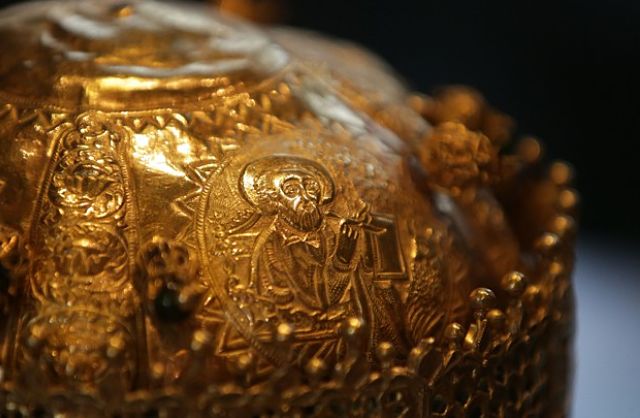 A crown seized by British troops at the battle of Maqdala in 1868 in Ethiopia is pictured at an exhibition, “Maqdala 1868: A Reflection on the 1868 Siege and Battle at Maqdala," at the Victoria and Albert Museum in London. Ethiopia wants treasures like this to be returned, part of a growing call for the restitution of treasures taken by European countries during the imperial age. (Getty Images)
A crown seized by British troops at the battle of Maqdala in 1868 in Ethiopia is pictured at an exhibition, “Maqdala 1868: A Reflection on the 1868 Siege and Battle at Maqdala," at the Victoria and Albert Museum in London. Ethiopia wants treasures like this to be returned, part of a growing call for the restitution of treasures taken by European countries during the imperial age. (Getty Images)
LONDON—In a storeroom of the British Museum here sits a collection of 11 wood and stone tablets that nobody is allowed to see. They are Christian plaques, or tabots, that represent the Ark of the Covenant, and they belong—though belong in this case is a contested term—to the Ethiopian Orthodox Church, which believes only its priests should view them.
The tabots were seized, along with hundreds of other precious items—processional crosses, gold and silver jewelry, illustrated manuscripts—by the British army in 1868, after it defeated Ethiopian Emperor Tewodros II at the battle of Maqdala. There is hardly a clearer case of officially sanctioned plunder: When Tewodros committed suicide, soldiers ransacked his treasury, then auctioned off their finds among their entourage to pay for the expedition. They had even brought along an expert from the British Museum to bid for some of the choicest items. The majority of the artifacts, some of which first passed through the hands of private owners, now sit in the collections of leading U.K. museums and libraries, even though Ethiopia has repeatedly asked for them back over the past century and a half.
Today, Ethiopia is asking once again, yet even in the case of the tabots—which are of limited use to the U.K., since literally nobody is allowed to see them—the answer is no. The British Museum’s best offer, made last month, was that it would consider the possibility of a long-term loan.
For many Ethiopians, the items seized at Maqdala are of vital importance—“a fundamental part of the existential fabric of Ethiopia and its people,” according to Hirut Kassaw, the country’s culture minister, who visited the U.K. in March and requested their return. To Britain, as with many of the objects gathered for its museums during the era of imperial expansion, the tabots mean relatively little by themselves—until, that is, someone asks for them back.
Requests for the permanent return of items taken without their owners’ consent, known as restitution, have gathered pace in recent years.
—
Related:
UK Kidnapped this Ethiopian Prince in 1868, Still Refuses to Return His Remains
The Battle Over Ethiopia’s Meqdela Treasures Heats Up
Ethiopians Urge Britain to Return Remains of Prince Alemayehu After 150 Years
150 Years After His Death Ethiopia Commemorates Life of Tewodros II
UK Museum Wants to Loan Ethiopia Looted Ethiopian Treasures. Why Not Return It?
Join the conversation on Twitter and Facebook.

























